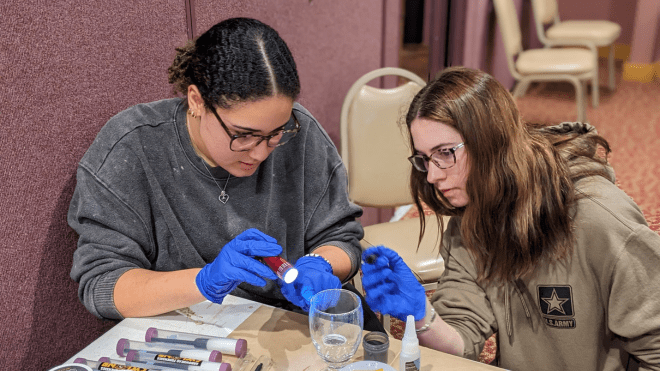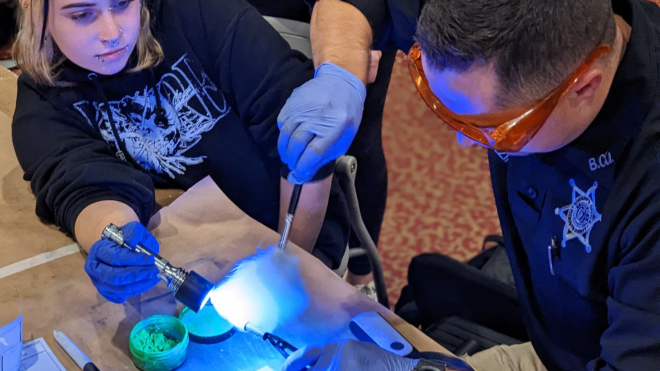Bridge to Justice: RWU Students Partner with JSTRI for Hands-on Evidence Recovery Training
In the Criminal Investigations course, undergraduate students learn alongside criminal justice professionals through mock crime scenes and real-life operating procedures

BRISTOL, R.I. – Imagine coming home to your dorm room and smelling a pungent aroma, only to find your roommate covered the place in ketchup. According to Professor Sean Gorman, that's what some Criminal Justice students do as part of an assignment to create a mock crime scene, where the bright red condiment may serve as a substitute for blood in their recreations.
As a real-world reinforcement of their education, students in Gorman’s Criminal Investigations class must create a mock crime scene, investigate it, and clean it up. After they complete this assignment, the students take part in the Crime Scene Processing and Evidence Recovery Workshop, hosted by Roger Williams University’s Justice System Training and Research Institute (JSTRI). Based in the School of Justice Studies, JSTRI provides resources and professional development training to justice system personnel and offers undergraduates the opportunity to learn alongside experts in the field.
“Having JSTRI in the School of Justice Studies allows for undergraduate and graduate students to get hands-on experience, network with professionals, and develop research and internship opportunities that support agency missions,” said Gorman, who is the Assistant Director of JSTRI and an adjunct professor at RWU.
Led by Shawn Dolan, owner of Forensic Evidence and Design Solutions, the Evidence Recovery training through JSTRI provides foundational and specialized training for justice system professionals. The training happens once a semester to coincide with Gorman’s class and teaches evidence recovery from various forms of evidence including fingerprints, bloodstains, and DNA. The criminal justice professionals who attend this training come from all around New England and range from first responders to detectives.
While the professionals gain key takeaways to apply directly in their field, the students who work alongside them learn skills that will propel them forward in their future careers. The undergraduate students who attended the training on Feb. 27-29 had the opportunity to learn how to use industry-standard equipment and operating procedures. Students took photos of blood stains, used chemicals to process fingerprints, and had access to a dark room dedicated to finding fingerprints using fluorescent powders.

“This has been one of my favorite experiences at Roger Williams,” said Sydni Unterweger, a senior Criminal Justice major from Plainville, Mass. “I am more of a hands-on learner, and this exceeded my expectations. I have always been interested in criminal investigation. This was a great opportunity to learn from people who are in the field, ask questions, and learn exactly how the job works.”
Some students took advantage of the opportunity to network. Laura Gamelin, a junior Criminal Justice major from Pembroke, N.H., said she met an officer who works one town over from her hometown and secured a ride along with their police department during spring break. “They gave me a lot of information about what law enforcement is and how I can prepare myself to become a police officer in the future,” Gamelin said. “I could not be more happy and grateful for these experiences.”
For Gorman, these personal interactions are what make the program so special. “It allows students to talk to professionals and see what they're going to do daily on the job,” he said. “I can tell them all day long what my experience was, but when they start hearing it from people who are physically doing it, it becomes a distinctive and impactful learning experience.”